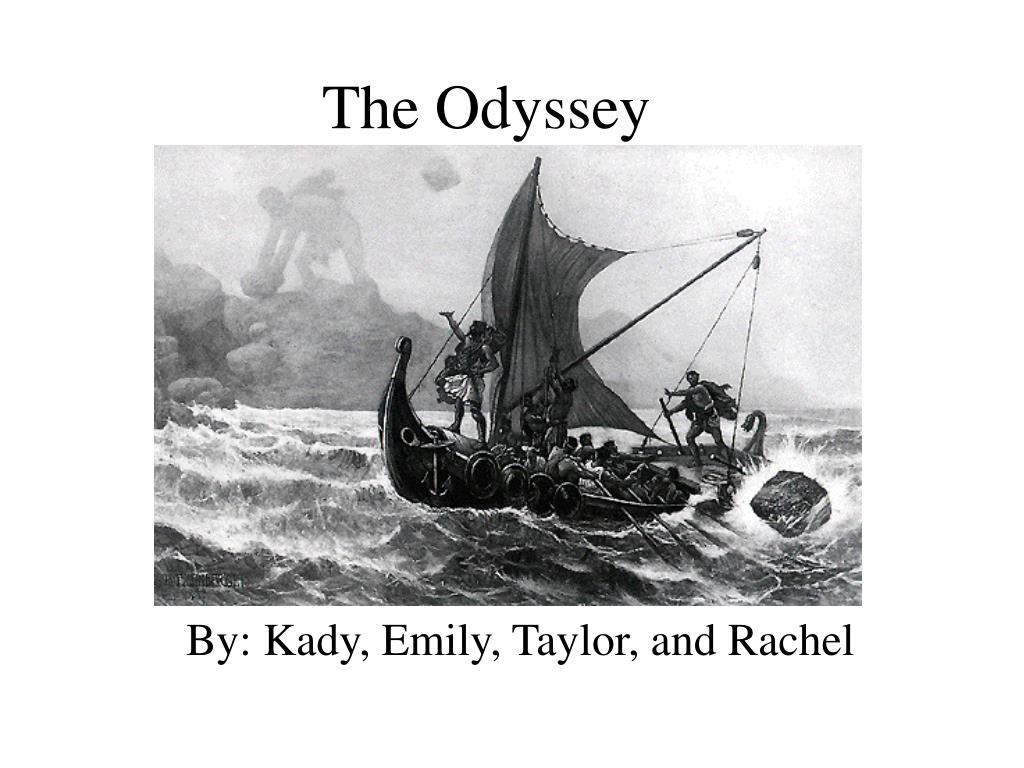

The details of the ancient oral performance, and the story's conversion to a written work inspire continual debate among scholars. Many scholars believe that the original poem was composed in an oral tradition by an aoidos, perhaps a rhapsode, and was more likely intended to be heard than read. It continues to be read in the Homeric Greek and translated into modern languages around the world. In his absence, it is assumed he has died, and his wife Penelope and son Telemachus must deal with a group of unruly suitors, the Mnesteres or Proci, who compete for Penelope's hand in marriage. It takes Odysseus ten years to reach Ithaca after the ten-year Trojan War.

The poem mainly centers on the Greek hero Odysseus and his journey home after the fall of Troy.

It is believed to have been composed near the end of the 8th century BC, somewhere in Ionia, the Greek coastal region of Anatolia. The poem is fundamental to the modern Western canon, and is the second oldest extant work of Western literature, the Iliad being the oldest. It is, in part, a sequel to the Iliad, the other work ascribed to Homer. The Odyssey is one of two major ancient Greek epic poems attributed to Homer.
#Odyssey meaning full
During the reunion, Athena is full of admiration, categorizing both herself and the cunning Odysseus as “old hands at the arts of intrigue.Freebase (0.00 / 0 votes) Rate this definition: Athena defines herself as Odysseus' helper, ally, and protector as the goddess presiding over intelligent warfare and the crafts, she is eager to “weave a scheme” in order to get rid of the suitors threatening Odysseus' domain over Ithaca. And now I am here once more, to weave a scheme with you and to hide the treasure-trove Phaeacia’s nobles lavished on you then -I willed it, planned it so when you set out for home -and to tell you all the trials you must suffer in your palace.” (13.329-48)Īthena speaks these lines, revealing her identity, after Odysseus has finally returned to the shores of Ithaca. Ah, but you never recognized me, did you? Pallas Athena, daughter of Zeus -who always stands beside you, shields you in every exploit: thanks to me the Phaeacians all embraced you warmly. Here among mortal men you’re far the best at tactics, spinning yarns, and I am famous among the gods for wisdom, cunning wiles, too. We’re both old hands at the arts of intrigue.

“Any man -any god who met you -would have to be some champion lying cheat to get past you for all-round craft and guile! You terrible man, foxy, ingenious, never tired of twists and tricks - so, not even here, on native soil, would you give up those wily tales that warm the cockles of your heart! Come, enough of this now. Later on in this scene, Odysseus himself weeps as he listens to the tale Demodocus tells. Odysseus praises Demodocus for his skill as a storyteller, which "surely the Muse has taught ," and his ability to express powerful, "true to life" emotions and experiences. In these lines, Odysseus asks the blind bard Demodocus to regale him with his own story-the story of the Trojan War. Sing that for me -true to life as it deserves - and I will tell the world at once how freely the Muse gave you the gods’ own gift of song.” (8.544-558) Epeus built with Athena’s help, the cunning trap that good Odysseus brought one day to the heights of Troy, filled with fighting men who laid the city waste. you sing the Achaeans’ fate, all they did and suffered, all they soldiered through, as if you were there yourself or heard from one who was. “Odysseus, master of many exploits, praised the singer: I respect you, Demodocus, more than any man alive - surely the Muse has taught you, Zeus’s daughter, or god Apollo himself. The passage begins with an invocation of the muse and a request for the story of "the man of twists and turns." As readers, we learn that we are about to hear the tale of Odysseus-“the man of twists and turns"-who went on a long, difficult journey and attempted (but failed) to bring his comrades home. These opening lines provide a brief synopsis of the plot of the poem. Launch out on his story, Muse, daughter of Zeus, start from where you will -sing for our time too.” (1.1-12) But he could not save them from disaster, hard as he strove - the recklessness of their own ways destroyed them all, the blind fools, they devoured the cattle of the Sun and the Sungod wiped from sight the day of their return. Many cities of men he saw and learned their minds, many pains he suffered, heartsick on the open sea, fighting to save his life and bring his comrades home. “Sing to me of the man, Muse, the man of twists and turns driven time and again off course, once he had plundered the hallowed heights of Troy.


 0 kommentar(er)
0 kommentar(er)
